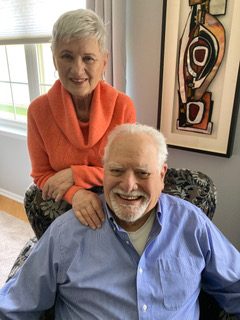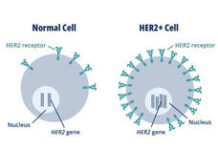Welcome to our newest blog series, “Five Questions With…” In this series, we will highlight the unsung heroes that make healthcare work. From guest services to the phlebotomist, the pet therapy volunteer, and the environmental services workers. These individuals enhance our experiences when we are getting care and highlight human connection and support. Thank you for all you do!
Today, we feature Stephen. Stephen is a Volunteer Ambassador in Radiation Oncology at Penn Medicine.
How long have you been in this position?

I have been a Penn Medicine Volunteer Ambassador in the Radiation Oncology Waiting Area for two years. Prior to that, my wife and I had been and continue to participate in the Head and Neck Cancer Support Group at Penn Medicine as well as the Radiation Oncology Alumni Group. In addition, we are both members/participants in the Radiation Patient & Family Advisory Committee at Penn Medicine.
What do I do to support patients and their caregivers?
For about 2 and a half hours, about one time a week, I perform my role as a Volunteer Ambassador in the Radiation Oncology Waiting Area. In that capacity, I circulate among the patients and their caregivers in the waiting area speaking and visiting with them.
In 2018 following my wife’s diagnosis of tonsil cancer, I happily performed my responsibility as her caregiver. When she was sent for radiation therapy, I sat in that same waiting area for 6 weeks during my wife’s radiation therapy. I believe I can relate to the people with whom I am interacting. In fact when I meet people there, I many times start my intro with the following statement – “I sat in these same chairs for 6 weeks and my responsibility was to make sure these chairs did not move.”
While the waiting area is relatively pleasant, having someone to talk with or simply schmooze with is very important to patients and their caregivers. Mostly, I approach someone and, after I introduce myself as a volunteer, I try to elicit from them if they are a patient awaiting treatment or caregiver to a patient. If they indicate they are willing to talk I will sit with them and attempt to find out more about them. E.g.: Are they a patient? Are they a caregiver? How long have they been coming to Penn Medicine? If appropriate, and they want to discuss it, what type of cancer is being treated? Where have they come from (geographically)? Did they come by car or public transit? Are they aware of the free (?) or validated parking? Do they know where they can get something to eat while they wait? Do they know about the free Wi-Fi connection or the services (dance therapy, music, origami, art, Reiki, yoga) available to them both as a patient or caregiver. All of these questions generally lead to more open discussions about their lives, etc., and for some, an appreciation for the tidbits of knowledge I can provide them about transportation, parking, food, etc.
I would guess that in my interactions with patients or caregivers, my role is not to linger on the actual reason for their presence in the waiting area (cancer treatment), but to try to take their minds off of the actual reason for their presence in the waiting area, and to provide a distraction.
Is there one particular story that sticks out in your head about a patient or caregiver, that I can share?
Actually, there are several stories, I can share. One involved a husband and wife. In speaking with them I learned that they had come to Penn Med from Beverly Hills, California. But, better yet, I learned they live on the exact same block, about 4 houses down, from where I lived until I was 8 years old. Another was an encounter with a caregiver who taught mathematics. I had been a math teacher as well. Another was a patient who was a physician. We just seemed to have struck up a wonderful friendship while chatting in the waiting area about all manner of things, not necessarily related to cancer or cancer treatment.
What is the most challenging part of my job?
I see the fundamental challenge to being a Volunteer Ambassador at Penn Medicine is dealing with the feelings after having been with a patient or caregiver whose cancer is particularly serious or whose immediate prospects are not particularly positive. People in those situations have an impact on my psyche.
What is the thing I love the most about my job?
Being a Volunteer Ambassador in the Radiation Oncology Waiting Area provides me with a sense that I am doing something very positive and providing a good experience to people who are otherwise going through one of the most difficult times of their lives. The feedback I receive from patients and caregivers is so rewarding. And the staff have told me, many times that my presence there does so much to help patients and caregivers. Knowing that I have made a difference, whether big or small, is a tremendous reward.
Do you want to nominate a staff member, volunteer, co-worker, or friend for us to feature in “Five Questions With…” Go to oncolink.org/feedback and let us know!







